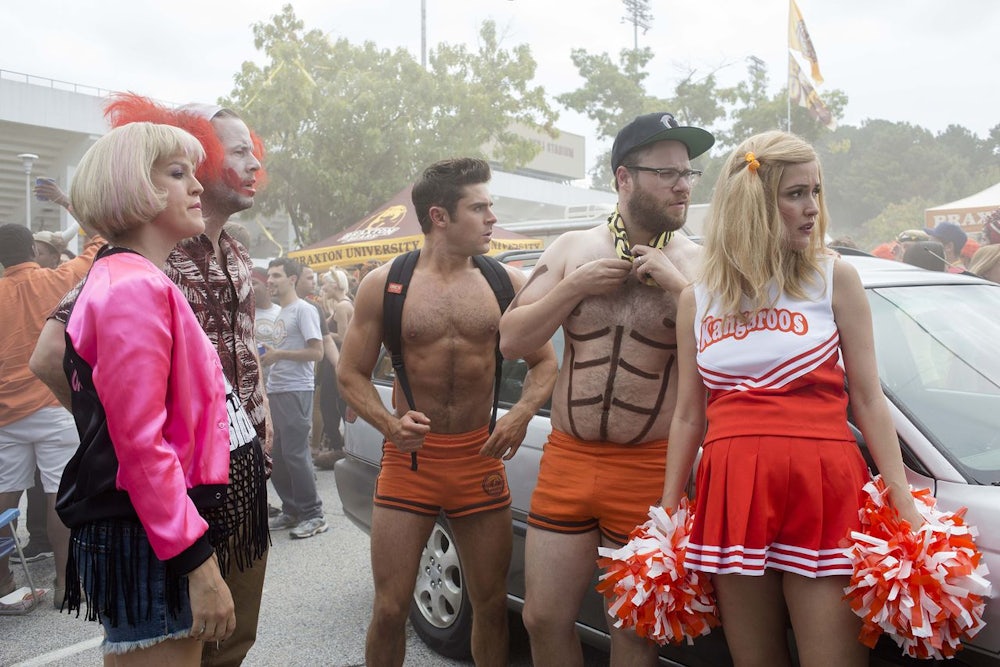Let’s get this out of the way first: There are a few moments in Neighbors 2: Sorority Rising where the film feels almost progressive. The movie’s plot is fueled by a real issue: that sororities, unlike fraternities, are unable to host parties on college campuses. Several characters comment incredulously on this fact; they point out that this inequality leads to a dangerous, degrading environment for college women. They’re right, of course: Women should be able to enjoy their college experience in the same dumb way men do, and a rule like this, even if it was designed ostensibly to protect women, is stupid and retrograde. I commend Neighbors 2 for making this point, and for arguing that female friendship and empowerment are important enough to receiving an airing in a major studio’s summer tentpole comedy. I just can’t say that makes it a good movie.
The first Neighbors movie, released in 2014, was a little more thoughtful than it had to be. Its elevator pitch—a rowdy fraternity moves next door to a married couple with a newborn—was impeccable, but it also had something real to say about growing up, becoming a parent, and accepting the undeniable truth that we’re all getting old and nobody really cares. Casting Seth Rogen, the perpetual irresponsible stoner dude, as the cranky dad next door was a masterstroke. The film also featured a terrific, bravura comic performance from Rose Byrne. But Neighbors had something else going for it: the movie was funny. Its jokes came at familiar material from new angles. The film’s best scene features Byrne infiltrating a frat party and using her maturity and intelligence to essentially destroy the place from the inside. The movie was inventive and smart; it was pretty much all you could expect a summer stoner comedy to be. And it was a success, which means it was time for a quickie cash-grab sequel.
And so everything you saw in the first movie, you’ll see again in the sequel—just with a slight twist added, to remind you that you didn’t accidentally walk into a theater showing a movie from 2014. This time, it’s a sorority that moves in next door to the married couple. This time, Zac Efron’s character sides with the old fogies. This time, Rogen and Byrne infiltrate a tailgate party rather than a frat party. The movie takes everything that worked in the first film and does it over again, only with a little less inspiration and a lot less energy. There are many funny people in this movie, and you can see them grasping at air, trying to catch anything comic and wring what they can out of it. The energy level here is dangerously close to the two Hangover sequels, which were such obvious cash grabs that by the third film, I’m pretty sure you could see Bradley Cooper and Zach Galifianakis flipping through their contracts to make sure they hadn’t accidentally signed up to do another one of these.
One of the more encouraging things about Rogen’s career has been how, despite his slacker image, he puts a little more thought into his stoner comedies than he necessarily has to. There’s always some sort of overarching theme, as well as a quiet insistence (probably from watching so many bad movies himself) on avoiding the easiest joke. That’s all gone here: His patter with Byrne, in particular, is strained and frantic, as if they just walked onto set and said, “Let’s try to be crazy like last time.” There’s a lot of empty improv in this Neighbors 2, scenes that have no real direction and no drive; the movie is all digression and shouted exposition.
Neighbors 2 also shuffles Dave Franco, the first film’s secret weapon, off to the side; it’s as if he was only available for one day of filming and had to cram it all in at once. (To be fair, his story has a clever twist that speaks to the film’s general progressive good cheer.) And Byrne, who was so good in the first film, barely gets a chance to do anything—which is particularly disappointing in a film that is ostensibly focused on sisterhood. For all those good intentions, the women in the sorority are far less sharply drawn than the frat brothers in the first film; Chloe Grace Moretz plays the right notes as the Efron-esque character, but there is no Franco sidekick alongside her. The feminist veneer just can’t mask the fact that no one involved in this movie is trying.
Grade: C-
Looking for more movie recommendations? Check out the latest episode of the Grierson & Leitch podcast.
Grierson & Leitch write about the movies regularly for the New Republic and host a podcast on film, Grierson & Leitch. Follow them on Twitter @griersonleitch or visit their site griersonleitch.com.
